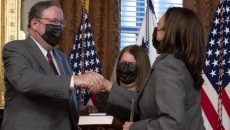OTTAWA - Canada's new immigration minister says the federal government is committed to finding long-term solutions to the Central American migration crisis that has forced millions from their homes.
Immigration Minister Sean Fraser delivered that message to the regional meeting in Guatemala that brought him face-to-face with the migration problems plaguing Canada's Western Hemisphere neigbourhood.
1/ Regional challenges require regional solutions. Today I joined my counterparts at #MIRPS to discuss how migration challenges in the region can only be solved by addressing what causes people leave their 🏠 & cross borders in the 1st place, including violence, crime, & poverty. pic.twitter.com/i2i5pa6ORx
— Sean Fraser (@SeanFraserMP) November 30, 2021
Fraser joined the UN High Commissioner for Refugees, Filippo Grandi, and representatives from Central American countries and the United States for the talks.
"Addressing migration and the forced displacement of human beings is one of the seminal issues of our time. And COVID-19 has only compounded the challenges that we face," Fraser told the annual meeting of a special UN regional committee where Canada has assumed the rotating chair this year.
"Tackling root causes like violence, crime, poverty and climate change are going to be crucial in solving Central America's migration challenges."
Fraser said Canada's approach to finding long-term solutions to the crisis would be focused on leveraging its feminist foreign policy which targets help towards women and girls as a way of elevating the economic circumstances of those around them.
The participants were meeting to address the migration crisis plaguing the hemisphere that has seen many flee their homes across Central America, amid the ripples of Venezuela's refugee crisis that is expected to displace six million people by year's end.
Fraser made it clear in an address to the meeting that Canada understands it must play a role in finding solutions to a problem in its own geopolitical backyard.
"I continue to see an attitude creep into the public discourse, not just in this region (but) in my own country as well, that at times we may not need one another to get along, that we may be better off on our own. And I can tell you in the strongest possible way that I disagree with that approach," Fraser said.
"Left unchecked, the most vulnerable people in the world will be placed at risk, the capacity of our national systems will be overwhelmed. And unhealthy attitudes that discriminate against newcomers will proliferate."
Recently, the North American Leaders Summit – the so-called Three Amigos – addressed the issue during talks in Washington between Prime Minister Justin Trudeau, U.S. President Joe Biden and Mexican President Andres Manuel Lopez Obrador.
They discussed the need to redouble efforts to tackle the migration crisis. The crisis has transformed Mexico into the third most popular country for refugees seeking asylum, which dictated why the issue was at the top of Lopez Obrador's agenda during the recent summit in Washington with Biden and Trudeau.
"We are talking about hundreds of thousands of migrants trying to enter or entering the southern border of Mexico, most of them trying to reach the U.S.-Mexico border. And the challenges in Mexico are enormous," Juan Jose Gomez Camacho, the Mexican ambassador to Canada, told The Canadian Press in a recent interview.
Gomez Camacho said Canada has not only financial resources but capacity to play a major role in finding long-term solutions to the migration crisis.
"We would like to see a very strong presence of Canada, helping to address these challenges in Central America. They need employment. They need a lot of work and social cohesion," Gomez Camacho said.
"These are things that Canada does pretty well," he said, stressing that over the long term "we need a North American approach."






